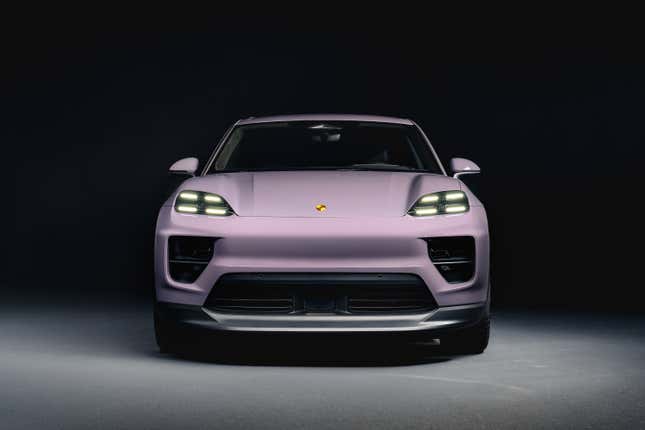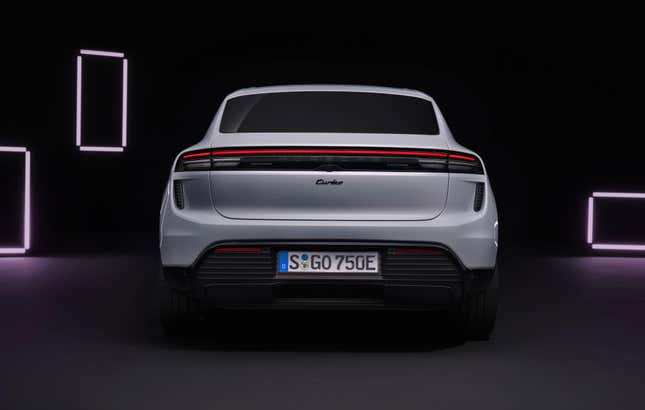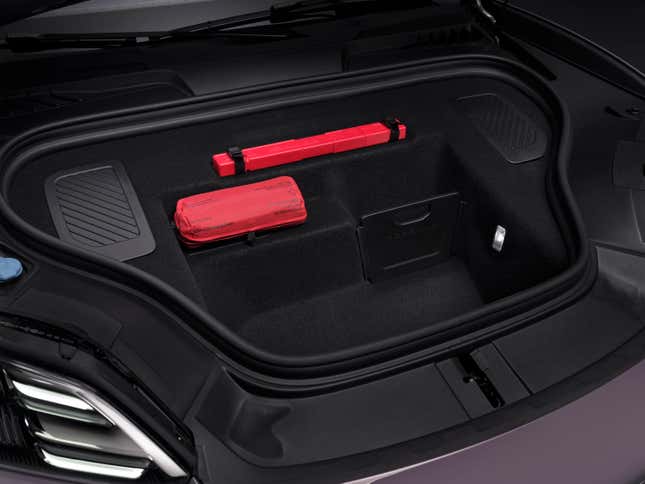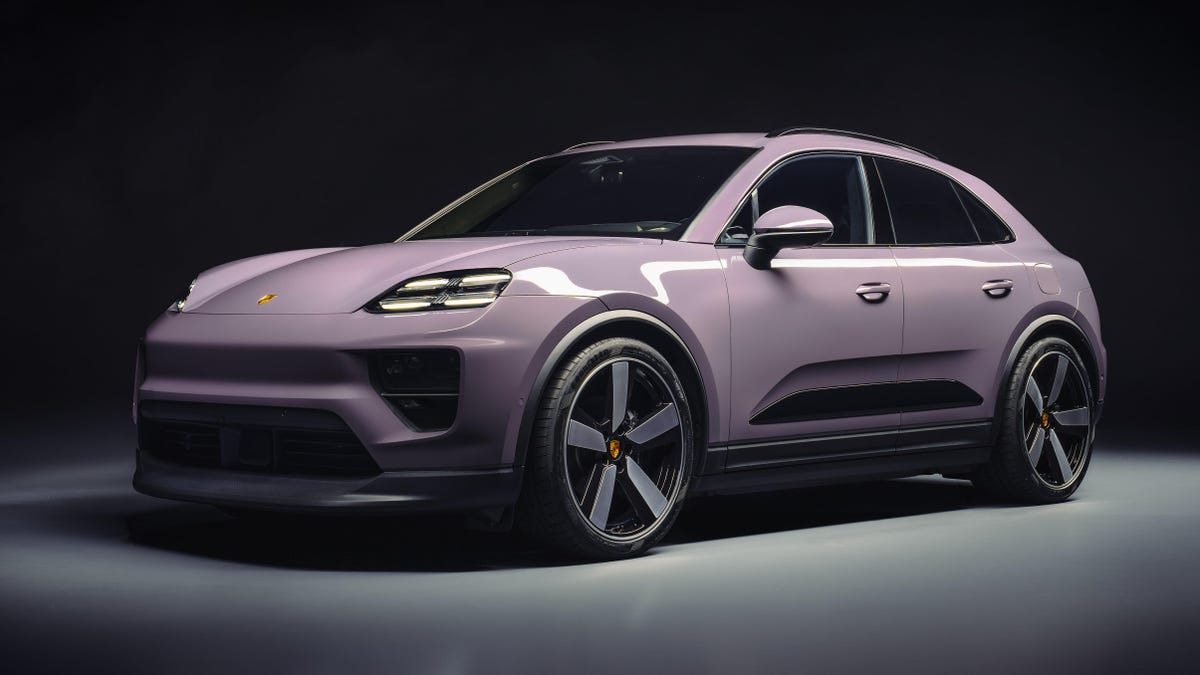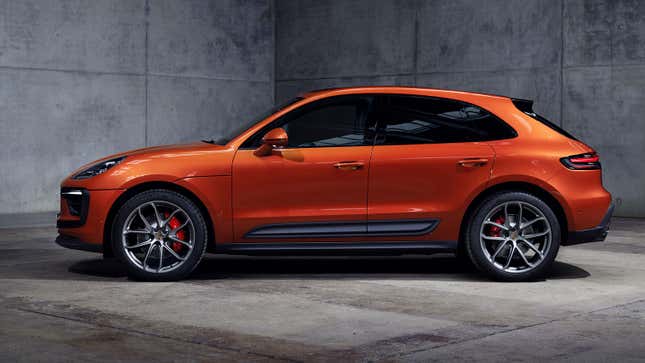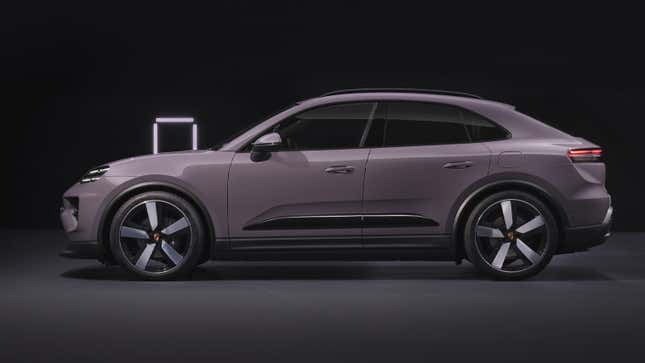After being announced in 2019 and following years of rumors, teasers and delays, the second-generation Porsche Macan has finally been revealed, and yes, it’s fully electric. Simply called the Macan — not Macan EV or Macan Electric — the new crossover is being pitched by Porsche as the sportiest model in its segment while offering increased levels of comfort, technology and space compared to the old gas-powered Macan.
The 2024 Macan is the first car to use the new 800-volt PPE platform that Porsche co-developed with Audi. No matter the trim, the 2024 Macan has a 100-kWh battery with 95 kWh of usable capacity, with DC fast-charging capability of up to 270 kW that can replenish the battery from 10 to 80 percent in 21 minutes. For better and more efficient charging at 400-volt stations, the battery can effectively split itself into two 400-volt batteries and charge them in parallel at up to 135 kW. While the Macan EV won’t have one-pedal driving — Porsche still doesn’t believe in that — it recuperates up to 240 kW through regenerative braking.
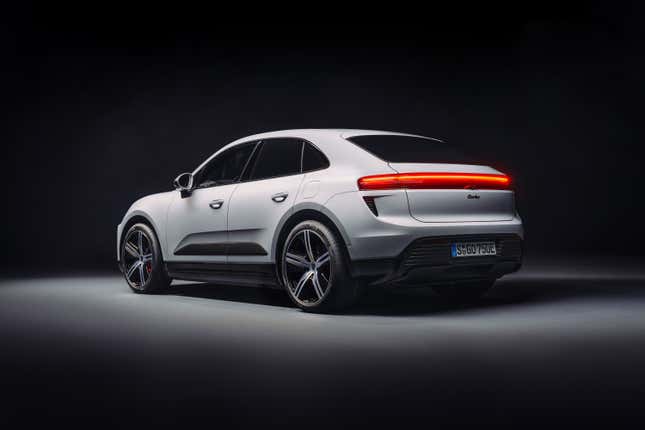
Porsche is starting the 2024 Macan lineup with two dual-motor all-wheel-drive models, the Macan 4 and the Macan Turbo, leaving room for multiple mid-range offerings plus eventual base RWD and top-end trims. The Macan 4 has 402 horsepower and 479 pound-feet of torque when the launch control’s overboost is active, enabling a 4.9-second 0-to-60-mph time and a top speed of 136 mph. The Macan Turbo, meanwhile, has 630 hp and 833 lb-ft, giving it a 3.1-second 0-60 time and a 161-mph top speed. For reference, the gas-powered base Macan has 261 hp and takes 6.0 seconds to hit 60 mph, and the top Macan GTS has 434 hp and reaches 60 in 4.3 seconds. Porsche says the next-gen electric motors were designed for reproducible power, and the Macan EV can also tow up to 4,409 pounds, which matches the gas Macan.
Straight-line performance isn’t the only benefit to the Macan going electric. The traction control system is five times faster than a regular AWD system, able to react to wheelspin in 10 milliseconds, and the Turbo gets Porsche Torque Vectoring Plus, which acts as an electronically controlled rear diff lock. Air suspension and Porsche’s Active Suspension Management (PASM) two-valve adaptive dampers come standard on every Macan EV, and rear-axle steering with a max angle of 5 degrees is optional for the first time.
At 188.4 inches long and 63.8 inches tall, the Macan EV is 4.1 inches longer and 0.1 inches lower than the first-gen Macan. Its wheelbase is 3.4 inches longer than the gas Macan’s, too, and the overhangs are shorter. Wheels up to 22 inches in size are offered (some with staggered widths, too), and the more sculpted fenders and angular side blade help accentuate new proportions. The EV’s rear glass has a steeper rake, giving it a rounded and more coupe-like roofline, and unlike the first-gen Macan it has frameless doors.
Porsche says the Macan EV has a drag coefficient of 0.25 (versus 0.35 for the old car), achieved using aerodynamic tricks like an active rear spoiler, active flaps in the front intakes, air curtains below the headlights, a louvered diffuser and flexible underbody covers. EPA figures won’t be released until closer to the Macan EV’s on-sale date later this year, but Edmunds recently did an unofficial 70-mph range test in two Macan EV prototypes, getting 325 miles in the Macan 4 and 305 miles in the Macan Turbo — that’s a big step up from the Taycan, the most efficient of which has an EPA range of under 250 miles.
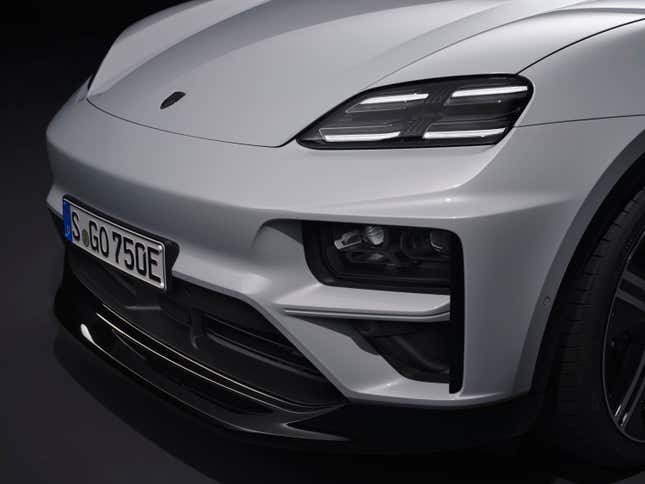
The most controversial styling aspect of the Macan EV will be the headlight setup. Four-point LED running lights sit at the top of the fenders like on other Porsches, but the actual headlights are lower down in the front bumper. Turbo models get a different front bumper with wing-like light surrounds and larger intakes, plus intakes just below the 3D taillight bar at the rear. Honestly, I think the four-eye setup looks great — the whole car does, to my eyes, especially in the Provence lavender color of the Macan 4 in these photos. I’m into the front end design, I love the squat stance and coupe-y roofline, and there are some really cool design details. The Macan lineage is obvious, but it feels fresh and forward-thinking.
Stepping inside might prove just as controversial for some, though owners of the Taycan and updated Cayenne will feel right at home. Every Macan EV has a 12.6-inch curved digital gauge cluster and a 10.9-inch center touchscreen, and it can be optioned with a 10.9-inch passenger display, all of which are running Porsche’s next-gen Android Automotive OS–based infotainment software. The center console has a mix of physical switches and touch-sensitive controls, and it has a cool semi-floating design with a lot more storage space and bigger cupholders. Shifting is achieved via a toggle switch on the right side of the steering column, while the power button is on the left, following in Porsche tradition.
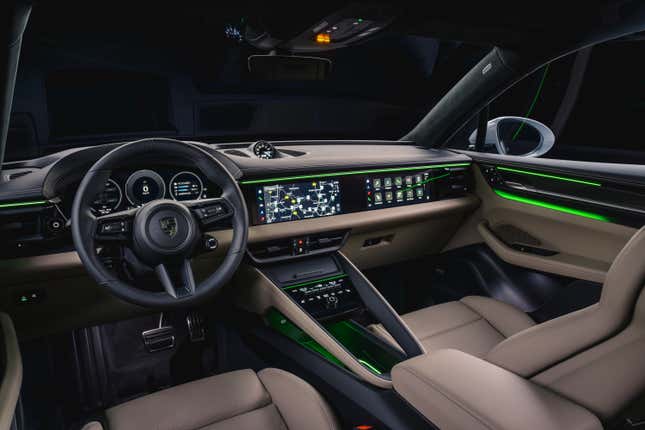
A strip of animated ambient lighting runs across the top of the dash and the door panels, serving both aesthetic and functional purposes — it can glow or pulse different colors to greet the driver, give charging information or provide driver-assist warnings. Another first is an augmented-reality head-up display that can project navigation arrows and other info; Porsche says it appears to be nearly 33 feet ahead of the driver and is representative of an 87-inch display.
The driver and front passenger seats are up to 1.1 inches lower than before while the rear bench is up to 0.6 inches lower, and Porsche says rear passengers have more legroom. No other interior dimensions have been given, but headroom definitely looks a little tighter thanks to the to the sleeker roofline. Porsche says the Macan EV has up to 18 cubic feet of cargo space with the rear seats up, nearly 1 cubic feet more than the gas Macan, and with the rear seats folded flat that increases to 46.5 cubic feet, which is actually 6.5 fewer than the gas Macan. The Macan EV also has a frunk with 2.9 cubic feet of space, the same size as the Taycan’s.
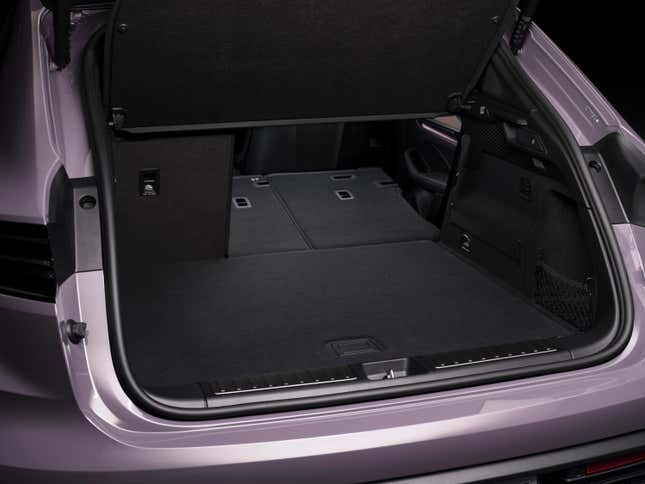
When it goes on sale in the U.S. in the second half of the year, the electric Macan 4 will start at $80,450 including a $1,650 destination charge, which is a big jump from the base gas-powered 2023 Macan’s $62,550 starting price. The new Macan Turbo will cost $106,950, a similarly big jump up from the $88,450 starting price of the 2023 Macan GTS. That also makes the Macan 4 only $400 away from the cost of a Porsche Cayenne, though it is $12,100 cheaper than a base rear-drive Taycan and $23,100 less than a Taycan 4 Cross Turismo. Considering the performance, features and technology the new Macan has compared to the gas model, the EV’s cost seems pretty reasonable.
Put it up against the existing competition and the Macan EV starts looking even more appealing. An all-wheel-drive Mercedes-Benz EQE350 SUV will set you back $79,900 and is both slower to accelerate and to charge, and the AMG performance model is more expensive than the Macan Turbo. At $67,800 to start the Genesis Electrified GV70 is a great bargain, but it doesn’t have a dedicated platform or design. Maserati’s electric Grecale Folgore still hasn’t gone on sale, and Audi’s Q6 E-Tron, which will share the Macan’s platform, hasn’t been revealed yet. And companies like Alfa Romeo, BMW and Range Rover won’t have a Macan EV competitor for at least another year or two.
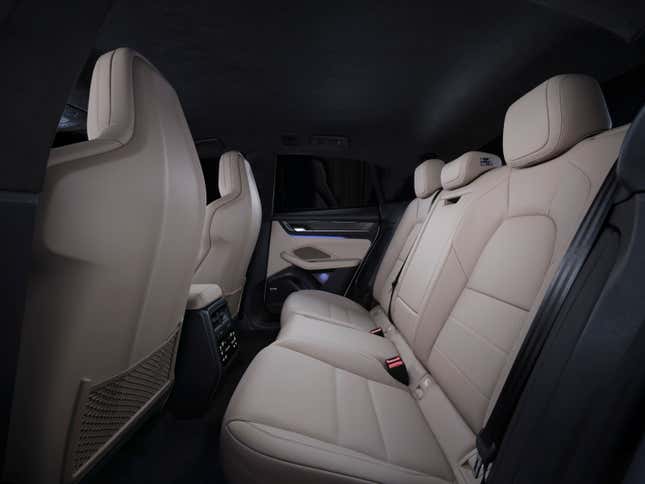
The first-gen Macan has been on sale for ten years, if you can believe that, and with more than 800,000 units sold it’s consistently Porsche’s best-selling model. In some countries, including the U.S., the gas Macan will continue to be sold alongside the Macan EV for at least a year or so to allow for an easier transition to electrification. Much ado has been made about that decision, with people saying it shows Porsche is making a mistake (and knows it) by going all-in on EVs so quickly, but I think that’s off the mark.
Since it went on sale in 2019, Porsche has sold more than 136,000 Taycans worldwide — in 2022 it even outsold the 911, and it regularly outsells competitors like the Tesla Model S. The Macan plays in a much more popular segment, and one with customers that seem to be even more accepting of electric vehicles. In the 2024 Macan’s press release, Porsche says its aim for the model is to “completely fulfill the requirements of Porsche customers choosing an SUV.” Everything that Porsche does is for the sake of performance and driver enjoyment, with style and practicality as an added bonus. If Porsche thinks going electric now is the right move, especially for its most popular model, I’m inclined to listen.
